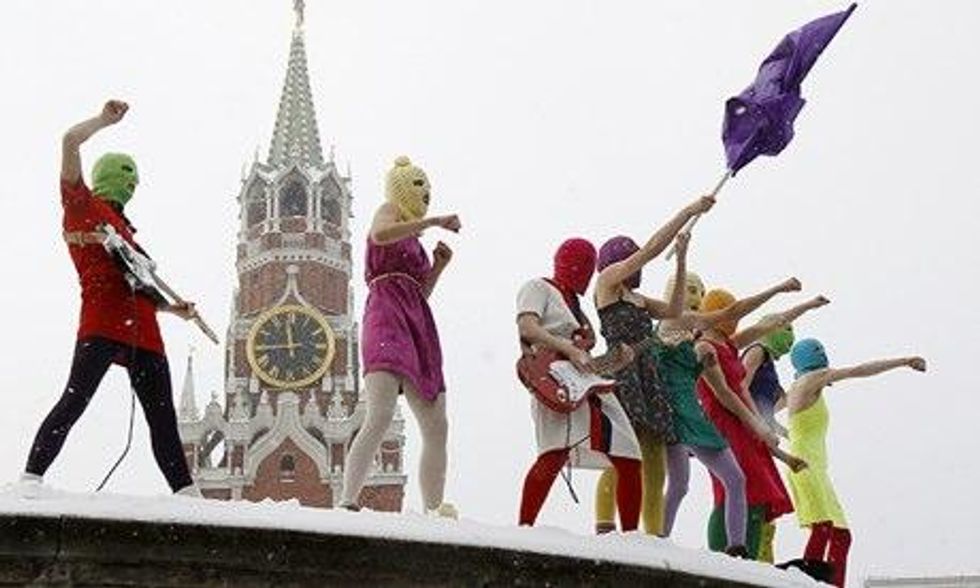2 January 2013
Dear Nadezhda,
I hope you have been able to organise your life in prison around small rituals that make it tolerable, and that you have time to read. Here are my thoughts on your predicament.
John Jay Chapman, an American political essayist, wrote this about radicals in 1900: "They are really always saying the same thing. They don't change; everybody else changes. They are accused of the most incompatible crimes, of egoism and a mania for power, indifference to the fate of their cause, fanaticism, triviality, lack of humour, buffoonery and irreverence. But they sound a certain note. Hence the great practical power of persistent radicals. To all appearance, nobody follows them, yet everyone believes them. They hold a tuning-fork and sound A, and everybody knows it really is A, though the time-honoured pitch is G flat." Isn't this a good description of the effect of Pussy Riot performances? In spite of all accusations, you sound a certain note. It may appear that people do not follow you, but secretly, they believe you, they know you are telling the truth, or, even more, you are standing for truth.
But what is this truth? Why are the reactions to Pussy Riot performances so violent, not only in Russia? All hearts were beating for you as long as you were perceived as just another version of the liberal-democratic protest against the authoritarian state. The moment it became clear that you rejected global capitalism, reporting on Pussy Riot became much more ambiguous. What is so disturbing about Pussy Riot to the liberal gaze is that you make visible the hidden continuity between Stalinism and contemporary global capitalism.
[Zizek then explores what he sees as a global trend towards limiting democracy.] Since the 2008 crisis, this distrust of democracy, once limited to third-world or post-Communist developing economies, is gaining ground in western countries. But what if this distrust is justified? What if only experts can save us?
But the crisis provided proof that it is these experts who don't know what they are doing, rather than the people. In western Europe, we are seeing that the ruling elite know less and less how to rule. Look at how Europe is dealing with Greece.
No wonder, then, that Pussy Riot make us all uneasy - you know very well what you don't know, and you don't pretend to have any quick or easy answers, but you are telling us that those in power don't know either. Your message is that in Europe today the blind are leading the blind. This is why it is so important that you persist. In the same way that Hegel, after seeing Napoleon riding through Jena, wrote that it was as if he saw the World Spirit riding on a horse, you are nothing less than the critical awareness of us all, sitting in prison.
Comradely greetings, Slavoj
23 February 2013
Dear Slavoj,
Once, in the autumn of 2012, when I was still in the pre-trial prison in Moscow with other Pussy Riot activists, I visited you. In a dream, of course.
I see your argument about horses, the World Spirit, and about tomfoolery and disrespect, as well as why and how all these elements are so connected to each other.
Pussy Riot did turn out be a part of this force, the purpose of which is criticism, creativity and co-creation, experimentation and constantly provocative events. Borrowing Nietzsche's definition, we are the children of Dionysus, sailing in a barrel and not recognising any authority.
We are a part of this force that has no final answers or absolute truths, for our mission is to question. There are architects of apollonian statics and there are (punk) singers of dynamics and transformation. One is not better than the other. But it is only together that we can ensure the world functions in the way Heraclitus defined it: "This world has been and will eternally be living on the rhythm of fire, inflaming according to the measure, and dying away according to the measure. This is the functioning of the eternal world breath."
We are the rebels asking for the storm, and believing that truth is only to be found in an endless search. If the "World Spirit" touches you, do not expect that it will be painless.
Laurie Anderson sang: "Only an expert can deal with the problem." It would have been nice if Laurie and I could cut these experts down to size and take care of our own problems. Because expert status by no means grants access to the kingdom of absolute truth.
Two years of prison for Pussy Riot is our tribute to a destiny that gave us sharp ears, allowing us to sound the note A when everyone else is used to hearing G flat.
At the right moment, there will always come a miracle in the lives of those who childishly believe in the triumph of truth over lies, of mutual assistance, of those who live according to the economics of the gift.
Nadia

4 April 2013
Dear Nadezhda,
I was so pleasantly surprised when your letter arrived - the delay made me fear that the authorities would prevent our communication. I was deeply honoured, flattered even, by my appearance in your dream.
You are right to question the idea that the "experts" close to power are competent to make decisions. Experts are, by definition, servants of those in power: they don't really think, they just apply their knowledge to the problems defined by those in power (how to bring back stability? how to squash protests?). So are today's capitalists, the so-called financial wizards, really experts? Are they not just stupid babies playing with our money and our fate? I remember a cruel joke from Ernst Lubitsch's To Be Or Not to Be. When asked about the German concentration camps in occupied Poland, the Nazi officer snaps back: "We do the concentrating, and the Poles do the camping." Does the same not hold for the Enron bankruptcy in 2002? The thousands of employees who lost their jobs were certainly exposed to risk, but with no true choice - for them the risk was like blind fate. But those who did have insight into the risks, and the ability to intervene (the top managers), minimised their risks by cashing in their stocks before the bankruptcy. So it is true that we live in a society of risky choices, but some people (the managers) do the choosing, while others (the common people) do the risking.
For me, the true task of radical emancipatory movements is not just to shake things out of their complacent inertia, but to change the very co-ordinates of social reality so that, when things return to normal, there will be a new, more satisfying, "apollonian statics". And, even more crucially, how does today's global capitalism enter this scheme?
The Deleuzian philosopher Brian Massumi tells how capitalism has already overcome the logic of totalising normality and adopted the logic of erratic excess: "The more varied, and even erratic, the better. Normality starts to lose its hold. The regularities start to loosen. This loosening is part of capitalism's dynamic."
But I feel guilty writing this: who am I to explode in such narcissistic theoretical outbursts when you are exposed to very real deprivations? So please, if you can and want, do let me know about your situation in prison: about your daily rhythm, about the little private rituals that make it easier to survive, about how much time you have to read and write, about how other prisoners and guards treat you, about your contact with your child ... true heroism resides in these seemingly small ways of organising one's life in order to survive in crazy times without losing dignity.
With love, respect and admiration, my thoughts are with you!
Slavoj

16 April 2013
Dear Slavoj,
Has modern capitalism really overtaken the logic of totalising norms? Or is it willing to make us believe that it has overpassed the logic of hierarchical structures and normalisation?
As a child I wanted to go into advertising. I had a love affair with the advertising industry. And this is why I am in a position to judge its merits. The anti-hierarchical structures and rhizomes of late capitalism are its successful ad campaign. Modern capitalism has to manifest itself as flexible and even eccentric. Everything is geared towards gripping the emotion of the consumer. Modern capitalism seeks to assure us that it operates according to the principles of free creativity, endless development and diversity. It glosses over its other side in order to hide the reality that millions of people are enslaved by an all-powerful and fantastically stable norm of production. We want to reveal this lie.
You should not worry that you are exposing theoretical fabrications while I am supposed to suffer the "real hardship". I value the strict limits, and the challenge. I am genuinely curious: how will I cope with this? And how can I turn this into a productive experience for me and my comrades? I find sources of inspiration; it contributes to my own development. Not because of, but in spite of the system. And in my struggle, your thoughts, ideas and stories are helpful to me.
I am happy to correspond with you. I await your reply and I wish you good luck in our common cause.
Nadia
Link to video: Pussy Riot on Putin, 'punk prayers' and superheroes
10 June 2013
Dear Nadezhda,
I felt deeply ashamed after reading your reply. You wrote: "You should not worry about the fact that you are exposing theoretical fabrications while I am supposed to suffer the 'real hardship'." This simple sentence made me aware that the final sentiment in my last letter was false: my expression of sympathy with your plight basically meant, "I have the privilege of doing real theory and teaching you about it while you are good for reporting on your experience of hardship ..." Your last letter demonstrates that you are much more than that, that you are an equal partner in a theoretical dialogue. So my sincere apologies for this proof of how deeply entrenched is male chauvinism, especially when it is masked as sympathy for the other's suffering, and let me go on with our dialogue.
It is the crazy dynamics of global capitalism that make effective resistance to it so difficult and frustrating. Recall the great wave of protests that spilled all over Europe in 2011, from Greece and Spain to London and Paris. Even if there was no consistent political platform mobilising the protesters, the protests functioned as part of a large-scale educational process: the protesters' misery and discontent were transformed into a great collective act of mobilisation - hundreds of thousands gathered in public squares, proclaiming that they had enough, that things could not go on like that. However, what these protests add up to is a purely negative gesture of angry rejection and an equally abstract demand for justice, lacking the ability to translate this demand into a concrete political programme.
What can be done in such a situation, where demonstrations and protests are of no use, where democratic elections are of no use? Can we convince the tired and manipulated crowds that we are not only ready to undermine the existing order, to engage in provocative acts of resistance, but also to offer the prospect of a new order?
The Pussy Riot performances cannot be reduced just to subversive provocations. Beneath the dynamics of their acts, there is the inner stability of a firm ethico-political attitude. In some deeper sense, it is today's society that is caught in a crazy capitalist dynamic with no inner sense and measure, and it is Pussy Riot that de facto provides a stable ethico-political point. The very existence of Pussy Riot tells thousands that opportunist cynicism is not the only option, that we are not totally disoriented, that there still is a common cause worth fighting for.
So I also wish you good luck in our common cause. To be faithful to our common cause means to be brave, especially now, and, as the old saying goes, luck is on the side of the brave!
Yours, Slavoj

13 July 2013
Dear Slavoj,
In my last letter, written in haste as I worked in the sewing shop, I was not as clear as I should have been about the distinction between how "global capitalism" functions in Europe and the US on the one hand, and in Russia on the other. However, recent events in Russia - the trial of Alexei Navalny, the passing of unconstitutional, anti-freedom laws - have infuriated me. I feel compelled to speak about the specific political and economic practices of my country. The last time I felt this angry was in 2011 when Putin declared he was running for the presidency for a third time. My anger and resolve led to the birth of Pussy Riot. What will happen now? Time will tell.
Here in Russia I have a strong sense of the cynicism of so-called first-world countries towards poorer nations. In my humble opinion, "developed" countries display an exaggerated loyalty towards governments that oppress their citizens and violate their rights. The European and US governments freely collaborate with Russia as it imposes laws from the middle ages and throws opposition politicians in jail. They collaborate with China, where oppression is so bad that my hair stands on end just to think about it. What are the limits of tolerance? And when does tolerance become collaboration, conformism and complicity?
To think, cynically, "let them do what they want in their own country", doesn't work any longer, because Russia and China and countries like them are now part of the global capitalist system.
Russia under Putin, with its dependence on raw materials, would have been massively weakened if those nations that import Russian oil and gas had shown the courage of their convictions and stopped buying. Even if Europe were to take as modest a step as passing a "Magnitsky law" [the Magnitsky Act in the US allows it to place sanctions on Russian officials believed to have taken part in human-rights violations], morally it would speak volumes. A boycott of the Sochi Winter Olympics in 2014 would be another ethical gesture. But the continued trade in raw materials constitutes a tacit approval of the Russian regime - not through words, but through money. It betrays the desire to protect the political and economic status quo and the division of labour that lies at the heart of the world economic system.
You quote Marx: "A social system that seizes up and rusts ... cannot survive." But here I am, working out my prison sentence in a country where the 10 people who control the biggest sectors of the economy are Vladimir Putin's oldest friends. He studied or played sports with some, and served in the KGB with others. Isn't this a social system that has seized up? Isn't this a feudal system?
I thank you sincerely, Slavoj, for our correspondence and can hardly wait for your reply.
Yours, Nadia
* The correspondence was organised by Philosophie magazine in cooperation with New Times. Longer versions can be found in German at philomag.de or in French at philomag.com. Tolokonnikova's letters were translated from Russian by Galia Ackerman




